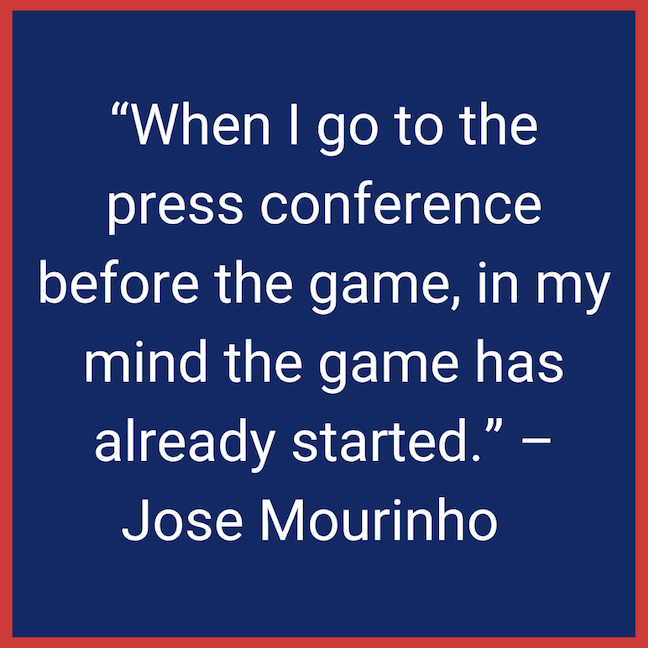24 January 2023

Developing The X-FACTOR To Transform Your Football Performances
How to Get Comfortable Being Uncomfortable
In football you’ll likely face different levels of adversity when you play, from making a mistake costing your team 3 points in an important game, being at a club where your coach doesn’t select you, you may try to learn new skills but get frustrated putting them together in a match, to picking up a serious injury which keeps you out of action for a long period. Personally, you may also be tested and come across relationship break ups or you may uproot somewhere new and find it difficult to settle.
It’s important to recognise that these experiences are a normal part of life and football, that obstacles are inevitable on your journey. However, this is so easy to forget and common reactions to such situations that you face are steeped in negative emotions. Then more negative emotions can follow depending on your environment; the messages that you receive, who you surround yourself with and how you spend your time. Poor focus, overwhelm and helplessness can then kick in even for the most mentally tough person.
The positive side of adversity
When you are able to push to one side perfectionist tendencies, your own ego, thoughts about pleasing other people (coaches or scouts), results and outcomes you can improve your appraisal of these situations and events.
As a footballer you can choose to view these situations as learning opportunities where you are gaining experience, knowledge and new skills. You can decide to accept that feeling uncomfortable is OK, that these experiences are vital for you to keep on improving.
Mental toughness and resilience development
If you put yourself out there, challenge yourself and do not shy away consistently increasing your tolerance to uncomfortable situations, as the Special Forces do intentionally and consistently you will find that a mindset shift occurs. Your mental toughness and levels of resilience will sky rocket, you’ll begin to get comfortable being uncomfortable and meet difficult situations head on.
Helping yourself as a football or soccer player
Step 1: Create your key ingredients that make up a great performance in a match (These are behaviours that you can control no matter who you play against or the match situation):
Here is an example of a striker, much like Johnny (pseudonym) a former client of mine, his key ingredients were:
Attacking
- Being loud, demanding the ball
- Using body strength to hold and turn with the ball.
- Make good runs in behind / and are clever with your runs.
- Movement, losing marker, being a nuisance to defenders.
- After missing chances, nothing changes I bounce back quickly.
Defensive
- Aggressive in 50/50s challenges / committed to tackles.
- Holding shape – mid block.
- Clever with pressing.
- Tracking back.
- Good communication, instructing your team-mates.
Step 2: Order your key ingredients as below with the easiest task (for you) at the top and the most difficult at the bottom for attacking and defending.
Attacking
- Using body strength to hold and turn with the ball.
- Movement, losing marker, being a nuisance to defenders.
- Being loud, demanding the ball
- After missing chances, nothing changes I bounce back quickly.
- Make good runs in behind / and are clever with your runs.
Defensive
- Clever with your pressing.
- Holding shape – mid block.
- Tracking back.
- Aggressive in 50/50s challenges / committed to tackles.
- Good communication, instructing your team-mates.
Step 3: Be brave and push yourself every time you train and play a match.
In the special forces, scenarios are designed to push even the most mentally tough person. Football doesn’t always work that way, it’s up to you how much you push yourself as a footballer, you can’t always rely on your coach, team-mates, opponents or the match situation. Football is very unpredictable, some days the coach may be concentrating more on other players, your team-mates may be switching off more than you’d like, opponents may be having a bad day and your team may be coasting 4 nil up. Yet, there are always ways that you can push yourself. You could choose one attacking and one defensive ingredient when you train and play in a match and do your utmost to get as close to rating yourself as a 10/10 as possible. You may want to start with what you perceive as easier tasks then look to challenge yourself as you improve and get to know the task better.
Step 4: Understand each task better by journalling.
Over a period of a few months, seek to work on all of the key ingredients by focusing on one each week in training and in matches. Also, journalling, writing down situations you did very well in, and situations you could have done better. When did you get lazy? When were you frightened? What distracted you? What were you thinking? What were you feeling? Get to understand this as much as you possibly can and then challenge yourself to do better next time.
Step 5: Get to know your key ingredients well.
Also get to know your key ingredients well, ACTUALLY VERY WELL! Write the key ingredients down, have them on your fridge or in your room, on your phone, in a kit bag to mentally prepare you and on your water bottle.
Step 6: Embrace the power of visualisation.
Lie down in a quiet space where you won’t be distracted and go to the movies! Visualising yourself doing those key ingredients really well on the training pitch and in matches. Seeing yourself demanding the ball, always involved, making it difficult for your opponents. Making the video in your mind as real as possible bringing in all of your senses with vivid images of yourself and others, real sounds and the feel of your body as it moves being at the forefront of your mind.
Step 7: Get uncomfortable when you visualise.
Again in this quiet space where you won’t be distracted, look to visualise challenges that you will likely face and can make some of the key ingredients extremely challenging, yet see yourself responding in a calm and composed manner, again bringing your senses to the fore and making the video feel very real.
BONUS….
Listen to this weeks Demystifying Mental Toughness Podcast where I speak to Team GB Ice Swimmer, Fenwick Ridley who gets very uncomfortable on a regular basis where he trains and competes in water less than 5 degrees Celsius.
We chat about ice swimming and mental toughness, cold water immersion and it’s effects on the mind and body. How cold water can have a positive impact on mental health and help you embrace the feelings of discomfort.
WORD OF THE DAY
Uncomfortable
When checking different meanings for “uncomfortable” I came across – causing feelings of unease. Feeling uneasy. Feeling discomfort.
Interestingly, Google then auto populated a question. What is a word for nervous and uncomfortable? The answer was afraid, agitated, annoyed, apprehensive, concerned, edgy, fussy, hesitant, hysterical, irritable, jittery, jumpy, shaky, shy, skittish, spooked, tense, timid, uneasy, uptight, volatile and weak.
This really resonated with me as it certainly does highlight how a lot of footballers go on to feel approaching a match. They let the initial feelings paralyse them and bit by bit their thoughts and emotions can get a lot worse.
The good news is that it doesn’t have to be that way. One thing you could try is laughter to overcome such feelings. Next time you’re uncomfortable why not laugh and say out loud “bring it on”. You could go one step further with a funny dance move to make yourself laugh. Sometimes humour really is a helpful tool.
CHECK US OUT ON INSTAGRAM WHERE YOU’LL FIND IMAGES AND POSTS LIKE THIS

⚽️ Football Coaches: When your team competes in matches do you find some players can struggle to show their true worth and are plagued by fear?
How do you help these players?
⚽️ It’s important to recognise that fear can be influenced by what they experience in their body. Someone with butterflies in their stomach or a tight chest can feel overwhelmed by discomfort, their thoughts can then run away from them and contribute to them feeling helpless.
⚽️ It’s also worth noting that when your players look fearful that you can their thoughts and feelings by your words, the tone of your voice, your body language and your actions.
⚽️ A question to consider, when you are frightened how can others help you?
TO DO LIST:
WATCH – This TED Talk – Get comfortable with being uncomfortable | Luvvie Ajayi Jones
EXPLORE – It can be easy to rush through life without stopping to notice much. Paying more attention to the present moment – to your own thoughts and feelings, and to the world around you – this can improve your mood, your performances and importantly your psychological wellbeing. This state of awareness is often called “mindfulness” which is a relatively new concept that can help us enjoy our football and life more and understand ourselves better.
FACT – Mindfulness is more than just a coping strategy or wellness practice–it actually can change the physical makeup of our brains. Researchers found that over time participants who practiced meditation and mindfulness increased the gray matter in brain regions associated with memory, learning, and focus. – Source
TIP – When you leave your home to go and play a match, slow down! Take your time to calm yourself by trying a 5 minute walking meditation in your street, garden or on your drive, walking around slowly in a circle. Placing your attention in your body. Noticing your weight shift from your heels through to your toes. Feeling the wind, cold or warmth on your face and body. Noticing your thoughts and letting them go. Focusing on the noises around you.
QUOTE –

THOUGHTS – When I read this quote I couldn’t help but smile. Jose is not someone I associate with keeping his emotions in check. Clearly though Jose recognised (on occasions) that his words, emotions and actions before a game could impact his players, his staff and the opponents. A consideration for football coaches, whether you’re at grassroots or manage in the premier league should be to recognise that the game doesn’t start at 3pm on a Saturday in lots of people’s minds it starts at long time before that so be mindful of what you say, how much you say, your tone of voice, your body language and your actions.
To the player who is fearful, low in confidence or naturally not the most confident person they’ll be especially susceptible when their pre match nerves kick in. Obviously, you can use that to your advantage too, in the way that you interact with the opposition, something Jose is known to do.
SHARE THE X-FACTOR
Share The X-FACTOR with your friends, family and colleagues, and create a positive difference to the lives of more football players, coaches, parents and enthusiasts.

Best Wishes
David Charlton
Online Sports Psychologist | Mental Performance Coach who supports many highly motivated athletes, young and old, developing their skills or who are already highly skilled so that they gain a mental edge and get the most from their talent across the globe from USA/Canada to Great Britain and Ireland to UAE, South Africa, Australia and New Zealand, using ONLINE Video Conferencing.
Managing Director – Inspiring Sporting Excellence
Host of Demystifying Mental Toughness Podcast
Founder of The Sports Psychology Hub
Author of The Mental Edge
With over a decades’ experience supporting athletes, coaches, parents and teams to transfer their skills from training to competitive situations, under pressure.
T: +44 7734 697769







